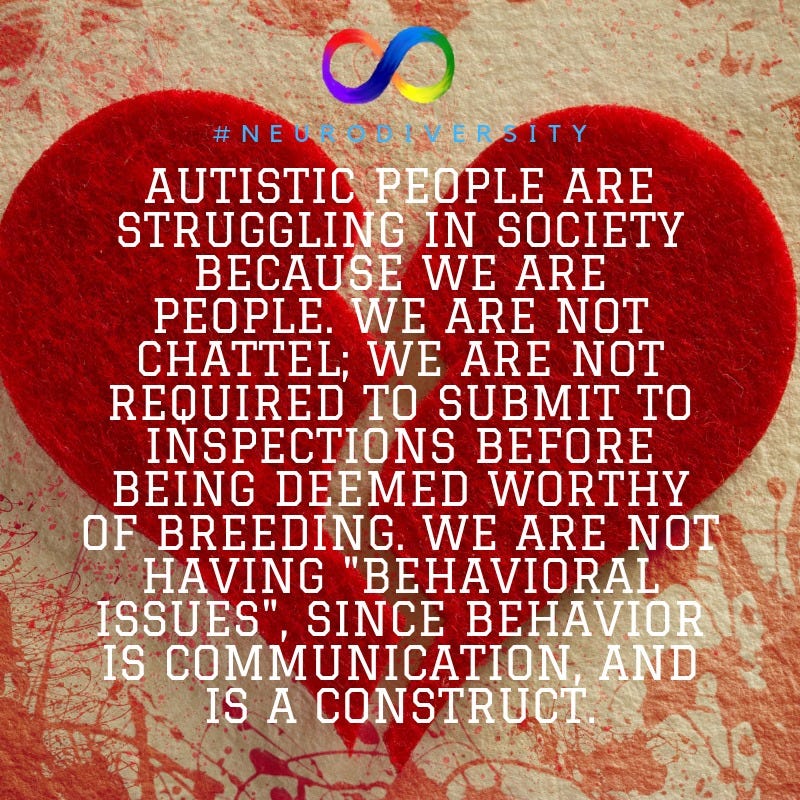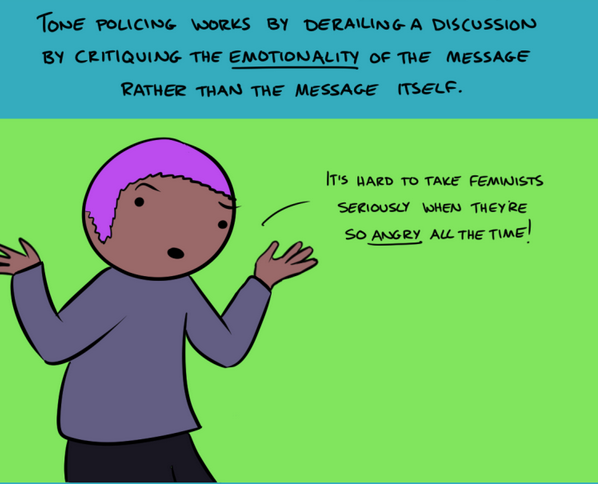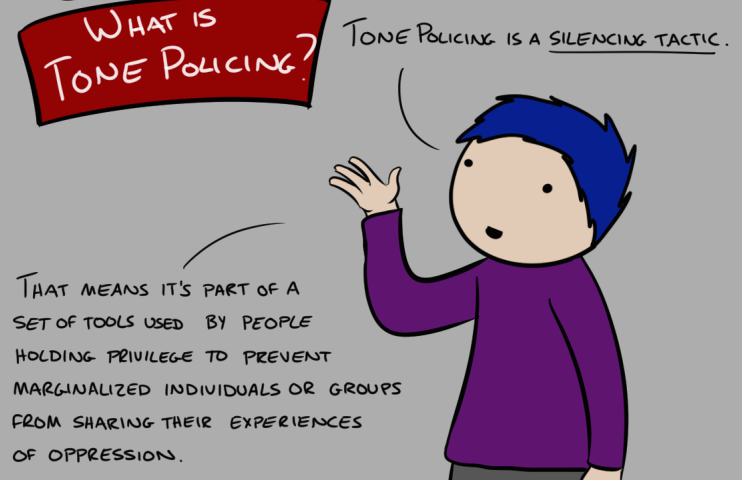UPDATED BLOG POST! ARCHIVE (2019): Meltdowns… When Emotions are too Much to Handle (re: alexithymia)
Meltdowns… When Emotions are too Much to Handle (re: alexithymia)

Text with a red broken heart felt background:
“Autistic people are struggling in society because we are people. We are not chattel; we are not required to submit to inspections before being deemed worthy of breeding. We are not having “behavioral issues”, since behavior is communication, and is a construct.
#Neurodiversity and the symbol for it are at the top.}
I’m going to be very honest here and say that the autistic meltdown is not the same thing as a neurotypical (NT) meltdown. It seems like privileged people live in a world where they don’t really experience feeling emotions as intensely… at least no where near to the extent that we autistics do. Why? The neurotypical and allistic brains are shaped differently. Therefore, they can only socially relate a little bit, but not fully. As a society, people have shamed autistics for having meltdowns because they are considered “bad behavior” by the person experiencing them. This doesn't mean that NTs do not experience meltdowns... Meltdowns are not necessarily bad to the autistic psyche. If anything, they’re a sign telling my body that I’ve had too much and I need a break. My brain doesn't always know how to read NT social interactions, and that can be overwhelming. They can be prevented though before they occur. Is it more important to the process if we’re shaming the meltdown, or helping the autistic person?
When we experience meltdowns, speaking from lived experience, once one occurs, it can’t be stopped. We also feel super guilty for them after because we are continuously conditioned to feel awful for having them. Most of the time, people solely look at the symptoms and not the cause. Why did the meltdown occur? What happened leading up to it? What could the person who caused it done differently? We also just feel bad for the experience as a whole because we’ve been taught that our meltdowns are seen as disrespectful at times. Many neurotypicals have no concept of what a meltdown feels like to the autistic person. For us, they feel like the end of the world every single time (in different, various levels), as if everything is falling apart all at once. What might be considered an intense meltdown for a Neurotypical might be on the smaller scale of things for the autistic individual. I experience what psychologists call Alexithymia, which is the inability to identify my emotions. No, this isn’t manageable, unless the environment I’m allows me to regulate by allowing the emotions to release without the other person or myself fighting them, and this is because it takes time for me to process them. If I'm around someone yelling at me for every little thing I've done "wrong", in a situation, it is much harder for me to therefore process my emotions in the moment. I cannot just manage my emotions in the same way as most people do. Regulation is very different for me. My amygdala is bigger, so my brain does not know how to. This is not fixable, and needs to just be accepted. I’ve not had the spoons to even write this, but it needs to be submitted today because people need to understand that we’re shamed for melting down all of the time. I have met plenty of autistics whose parents shame them and have shamed them for experiencing overload. Now, I would be remiss if I didn’t talk about the other side to the coin. Sometimes autistic’s actions can cause the other person to lead us into a meltdown. But this isn’t occurring nowhere nearly as often as it being due to the lack of understanding of how we work. And those can go hand in hand. And, the double empathy conundrum exists. Don’t believe me? Please read Damien Milton’s study here.
It’s ironic how people accuse us of lacking empathy, but then when we ask them for empathy, they then refuse to give it. I am seen as a “burden” and that my meltdowns are just “excuses” (meaning, they perceive them as tantrums). Meltdowns are not able to be prevented once they occur. If it’s not a meltdown, we usually experience what is called a shutdown (*which is an internalized meltdown), which just means that you’re making things worse and not better. Instead of me actually being accommodated for, I’m then expected by the neurotypical person to suppress my emotions, as if somehow it’s my fault and not their own fault for causing it if their behavior is what caused me to shutdown. Some people often forget about how our neurology works. Just because someone sits behind a computer, digs into research, and works with people who are autistic, or talks to autistics, it does not mean that they have the lived experience of being #actuallyautistic. It’s time to stop shaming autistics for the way that we are born (note: autism and alexithymia are two separate conditions). I’m sure if someone had alexithymia and was not autistic, they would feel the same way. We’re taught to mask our emotions just to please others, and at what cost? It’s not helpful to our neurology and mental health. It only puts what we do to shame and tells us that what we experience as autistics is not “real”, even though the person doesn’t understand. I’ve lost count over the years as to how many times I’ve been tone policed. Tone policing is a silencing tactic used by oppressors to manipulate the oppressed and minimize what we are saying and how we’re saying it. Basically, if some abled’s *feelings* are *hurt* by what we say, specifically by the tone in which how we say it, and then the oppressed person is attacked by the other person’s emotions, then that is dismissive of the person’s identity. It’s one thing if the person does not understand or know, and has never interacted with us before. If that occurs, I use a call-in approach. After a while, if the ignorance continues, and someone keeps persistently denying what I say in order to minimize how I am saying it, then that only further perpetuates the conflict, and does not resolve anything.


At some point, people (especially professionals) need to realize that we are human beings too. We are not trainable, fixable, or micro-manageable. We do not have behavioral “issues”, and if that’s how people look at us, then I dare them to step in our shoes.
Next... what is regulation for autistics?
When I feel emotions, they’re never not heightened. For non-autistic people who are not alexithymic, the concept of alexithymia is unfamiliar with regulation for autistic people. Like a 10 point rating scale used for meltdowns, I can usually quantify how intense my unidentified feelings are everyday. How? Because I know that when I am experiencing these unidentified feelings, I am overwhelmed, fatigued, tired, and not wanting to verbally talk every time, and I want to retreat (unless the environment is allowing the meltdown to occur safely). I adapt to my own needs during this process, and it’s a survival coping tactic. And yet, people shame us for this all of the time. Coping is considered not allowed thanks to micro-aggressions that occur systemically in behavioral therapies (not solely ABA). This, to the professional mindset, sounds a little similar to bipolar disorder. The difference? My emotions aren’t identifiable, which makes things much more overwhelming. I also don’t experience mania or persistent mood swings simply in the same sense. If anything, I’m feeling more than three emotions and can’t figure what they are until I can calm down and process them. I can’t even prevent my emotions from being unidentifiable in the heat of the moment. I can learn how to identify them over time, but that requires a safe environment each time with healthy supports. Alexithymia, for the uninformed mind, is usually caused by prolonged exposure to trauma, but for the autistic mind is because of the autistic brain being wired a specific way, and the person who experiences alexithymia typically also experiences PTSD. Someone who is autistic also may experience bipolar disorder, but they are comorbidities.
With trauma, autistics don’t experience PTSD/C-PTSD in the same way as the allistic community. And this should not be surprising because our cognition is genetically different. When we experience trauma, the flight or fight response is more heightened due to the unidentified feelings, as well as the size of my amygdala. I can’t just easily snap out of a flashback, not only because I am a very visual thinker (I don’t unconsciously think in words), but also because I am unable to stop the rumination in the same ways as others. Positive rumination occurs after the negative rumination occurs. During a meltdown we can’t even think at all sometimes, depending on how intense it is. Because autistics are visual thinkers (as well as pattern-based thinkers), the processing and emotional internal experience that goes on will be different than the general population. Plus, because regulation is harder; therefore, we don’t just get to cope in the same ways. For us, survival in those moments is coping. People removing us from things that trigger us is best, and often times flashbacks can cause meltdowns. People accommodating the environment for us in those moments is what would be ideal. Why? For us, because of unidentified feelings, visual thinking, a bigger amygdala, and the way our brains handle meltdowns when they occur (through visual rumination), it’s ten-fold harder for us to cope with everyday stressors. Which is why it is urgent and necessary for the autistic community be accommodated for. We’re just asking you to meet us in the middle. We don’t expect you to change who you are with your autonomy. We just want to be met with accommodations.
Challenge yourself, reader, on what behavior is. Then ask yourself what is bad behavior vs good behavior. Apply that to the NT population, and it works wonders. Yet, because behavior is solely a construct for autistic people, ask yourself if the behavior is about you in that moment. If it isn’t, why should you try and fix it? Is it life threatening? Have compassion for the autistic person. We always try and fix people’s behavior…. even those who aren’t autistic. If it is life threatening, as hard as it is to do this, why is it occurring? Now, the next important topic to discuss is violence. Most non-speaking and speaking autistics are not likely to have a violent personality type. Is you fixing the behavior in the moment helping or making things worse? Some people assume that extreme behaviors are justified, and they aren’t. No one is justifying those things, and yet we can prevent them from happening. How? Making it not about you in that moment is key because then you’re giving empathy to the person who probably wasn’t intentionally violent. Self injurious behaviors (SIBs) and other types of harmful behaviors aren’t always intentional. But the methods in which ABA therapists are trained in handling restraint are unethical. And restraint occurs more often than people realize. If restraint needs to occur, then it must. But I’d only look at it as a last resort. Too many people want to restrain right away, and not talk things out, or use another method. I’d only ever see restraint being used for self-defense, or for self injurious behaviors, as those are two reasonable times simply due to life threatening circumstances. What do we consider teaching autistic people out of this? If a child is throwing something, give them stress balls to throw at a door, or something safe that won’t break anything (one example). I would continue, but have made my point, reader, to challenge you on your own ways to accept autistic behavior. Please start presuming competency and focus on acceptance. Please treat us like people. We’re not chattel, and are capable of self acceptance. Please allow acceptance to be a focus in your treatment plans, session plans, lesson plans, etc.
Thank you for reading. #actuallyautistic


Comments
Post a Comment